Fünf Jahre bevor die Millennium Development Goals 2015 erreicht werden sollen, sind angesichts der Probleme der „entwickelten“ Staaten durch die Finanz- und Wirtschaftskrise nachhaltige Entwicklungsperspektiven für den globalen Süden in den Hintergrund getreten. Doch gerade jetzt, in dieser globalen Umbruchphase, ist das Thema nachhaltige Entwicklung von herausragender Relevanz. Der vorliegende Band analysiert die Bedeutung und die Facetten der ökologischen, sozialen und ökonomischen Nachhaltigkeit, zeigt strukturelle Herausforderungen für eine nachhaltige Entwicklung auf und diskutiert deren Förderung durch internationale Zusammenarbeit. Dabei nähern sich Experten, Wissenschaftler und Praktiker aus der Entwicklungszusammenarbeit aus verschiedenen Blickwinkeln einzelnen Aspekten des komplexen Themenfelds an. Auf diese Weise befasst sich der Sammelband mit den wichtigsten Konzepten und drängendsten strukturellen Problemen aktueller Entwicklungspolitik.
Aktualisiert: 2023-07-02
> findR *
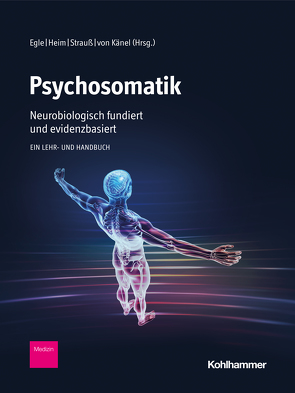
A wealth of new findings in the fields of neurobiology and molecular biology, epigenetics and developmental psychology in the field of stress research have led to a far-reaching paradigm shift in psychosomatic medicine during the last 10 years. Traditional theoretical models of various schools of psychotherapy on the development and treatment of numerous diseases with physical cardinal symptoms have consequently lost their significance. The present work begins with 21 chapters providing a current stocktaking of the scientifically proven biopsychosocial foundations of this new psychosomatics, and then in a further 68 chapters it presents the various implications for the diagnosis and treatment of numerous diseases in the different medical disciplines, based on the findings of basic research. These are supplemented by articles on social medicine, assessment and prevention.
Aktualisiert: 2023-06-30
Autor:
Laura Anderegg,
Selma Aybek,
Sarah T. Ballach,
Karl-Jürgen Bär,
Jürgen Bengel,
Elisabeth Binder,
Cornelia Bittmann,
Oliver Bohlen,
Jessica Bosch,
Peer Briken,
Emily Brindley,
Timo Brockmeyer,
Victoria Lucia Cammann,
Hannah Cheng,
Marianna Di Chiara,
Felix de Courbière,
Tatjana Crönlein,
Felix Dammering,
Monika Daubländer,
Claus Derra,
Beate Ditzen,
Florence Dorr,
Marie-Luise Ecker-Egle,
Ulrich T Egle,
Niklaus Egloff,
Ulrike Ehlert,
Sonja Entringer,
Elissa Epel,
Yesim Erim,
Hermann Faller,
Anja C. Feneberg,
Serena Fiacco,
Johannes B. Finke,
Felix Fischer,
Susanne Fischer,
Magdalena Flatscher-Thöni,
Fritjof von Franqué,
Matthias Franz,
Harald J Freyberger,
Hans-Christoph Friederich,
Ingo Froboese,
Bernd Fromm,
Jens Gaab,
Werner Geigges,
Alexander L. Gerlach,
Ulfried Geuter,
Uwe Gieler,
Ute Katharina Gitzen,
Lutz Goetzmann,
Stefan Gold,
Harald Gündel,
Alfons Hamm,
Gregor Hasler,
Winfried Häuser,
Tobias Hecker,
Thomas Heidenreich,
Christine Heim,
Beate Herpertz-Dahlmann,
Anja Hilbert,
Thomas Hillecke,
Sebastian C. Holst,
Anita Horn,
Frank Jacobi,
Jochen Jordan,
George J. Kahaly,
Peter Fritz Keller,
Olga Klimecki,
Nina Knoll,
Andrea Knop,
Anna Katharina Koch,
Julian Koenig,
Volker Köllner,
Alexander Konnopka,
Peter C. Konturek,
Thula Koops,
Rachel Kosciusko,
Peter M. Kreuzer,
Johannes Kruse,
Karl Heinz Ladwig,
Claas Lahmann,
Astrid Lampe,
Hans-Peter Landolt,
Richard D. Lane,
Berthold Langguth,
Eike Langheim,
Jost Langhorst,
Peter Langner,
Claudia Lazarides,
Nadine Lehnen,
Astrid Lehner,
Boris Leithäuser,
Claas Lendt,
Denise Lenski,
Frank Leweke,
Karoline Lukaschek,
Wolfgang Lutz,
Andreas Maercker,
Alexandra Martin,
Anja Mehnert-Theuerkauf,
Laura Mernone,
Johannes Michalak,
Dorothee von Moreau,
Urs M. Nater,
Tobias Nolte,
Emilou Noser,
Silvia Oddo-Sommerfeld,
Christian Otte,
Ritambhara Pathak,
Achim Peters,
Eva Peters,
Katharina Peters,
Anke Petersen,
Anna Pohl,
Roman Prem,
Hans-Christian Puls,
Katharina Radziej,
Meera Rajput,
Antje Rauers,
Günter Reich,
Viktoria Ritter,
Thomas Ritz,
Volker Roelcke,
Frank Röhricht,
Matthias Rose,
Michael Rufer,
Hartmut Schächinger,
Rainer Schäfert,
Henning Schauenburg,
Martin Schecklmann,
Maren Schick,
Charlotte Lisa Schmidt,
Jennifer Schmidt,
Jessica Schoch-Ruppen,
Christian Schubert,
Stefan R. Schweinberger,
Johannes Siegrist,
Joe Simon,
Timo Slotta,
Ryan Smith,
Sarah Sommerlad,
Ulrich Stangier,
Jennifer Steel,
Timothy J. Strauman,
Bernhard Strauß,
Konrad Andreas Szawan,
Christian Templin,
Jelena Templin-Ghadri,
Veronika Vielsmeier,
Heiner Vogel,
Roland von Känel,
Isi Wang,
Claudia Welte-Jzyk,
Gabriele Werner-Felmayer,
Esther Werth,
Bernhard Widder,
Christiane Wilke,
Sibylle Maria Winter,
Tewes Wischmann,
Alexander Wormit,
Stephan Zipfel,
Martina de Zwaan
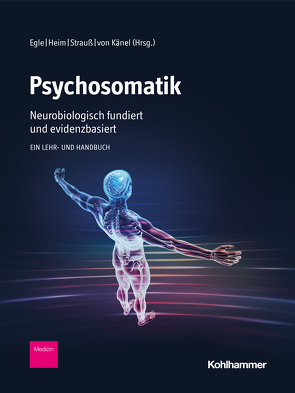
A wealth of new findings in the fields of neurobiology and molecular biology, epigenetics and developmental psychology in the field of stress research have led to a far-reaching paradigm shift in psychosomatic medicine during the last 10 years. Traditional theoretical models of various schools of psychotherapy on the development and treatment of numerous diseases with physical cardinal symptoms have consequently lost their significance. The present work begins with 21 chapters providing a current stocktaking of the scientifically proven biopsychosocial foundations of this new psychosomatics, and then in a further 68 chapters it presents the various implications for the diagnosis and treatment of numerous diseases in the different medical disciplines, based on the findings of basic research. These are supplemented by articles on social medicine, assessment and prevention.
Aktualisiert: 2023-06-30
Autor:
Laura Anderegg,
Selma Aybek,
Sarah T. Ballach,
Karl-Jürgen Bär,
Jürgen Bengel,
Elisabeth Binder,
Cornelia Bittmann,
Oliver Bohlen,
Jessica Bosch,
Peer Briken,
Emily Brindley,
Timo Brockmeyer,
Victoria Lucia Cammann,
Hannah Cheng,
Marianna Di Chiara,
Felix de Courbière,
Tatjana Crönlein,
Felix Dammering,
Monika Daubländer,
Claus Derra,
Beate Ditzen,
Florence Dorr,
Marie-Luise Ecker-Egle,
Ulrich T Egle,
Niklaus Egloff,
Ulrike Ehlert,
Sonja Entringer,
Elissa Epel,
Yesim Erim,
Hermann Faller,
Anja C. Feneberg,
Serena Fiacco,
Johannes B. Finke,
Felix Fischer,
Susanne Fischer,
Magdalena Flatscher-Thöni,
Fritjof von Franqué,
Matthias Franz,
Harald J Freyberger,
Hans-Christoph Friederich,
Ingo Froboese,
Bernd Fromm,
Jens Gaab,
Werner Geigges,
Alexander L. Gerlach,
Ulfried Geuter,
Uwe Gieler,
Ute Katharina Gitzen,
Lutz Goetzmann,
Stefan Gold,
Harald Gündel,
Alfons Hamm,
Gregor Hasler,
Winfried Häuser,
Tobias Hecker,
Thomas Heidenreich,
Christine Heim,
Beate Herpertz-Dahlmann,
Anja Hilbert,
Thomas Hillecke,
Sebastian C. Holst,
Anita Horn,
Frank Jacobi,
Jochen Jordan,
George J. Kahaly,
Peter Fritz Keller,
Olga Klimecki,
Nina Knoll,
Andrea Knop,
Anna Katharina Koch,
Julian Koenig,
Volker Köllner,
Alexander Konnopka,
Peter C. Konturek,
Thula Koops,
Rachel Kosciusko,
Peter M. Kreuzer,
Johannes Kruse,
Karl Heinz Ladwig,
Claas Lahmann,
Astrid Lampe,
Hans-Peter Landolt,
Richard D. Lane,
Berthold Langguth,
Eike Langheim,
Jost Langhorst,
Peter Langner,
Claudia Lazarides,
Nadine Lehnen,
Astrid Lehner,
Boris Leithäuser,
Claas Lendt,
Denise Lenski,
Frank Leweke,
Karoline Lukaschek,
Wolfgang Lutz,
Andreas Maercker,
Alexandra Martin,
Anja Mehnert-Theuerkauf,
Laura Mernone,
Johannes Michalak,
Dorothee von Moreau,
Urs M. Nater,
Tobias Nolte,
Emilou Noser,
Silvia Oddo-Sommerfeld,
Christian Otte,
Ritambhara Pathak,
Achim Peters,
Eva Peters,
Katharina Peters,
Anke Petersen,
Anna Pohl,
Roman Prem,
Hans-Christian Puls,
Katharina Radziej,
Meera Rajput,
Antje Rauers,
Günter Reich,
Viktoria Ritter,
Thomas Ritz,
Volker Roelcke,
Frank Röhricht,
Matthias Rose,
Michael Rufer,
Hartmut Schächinger,
Rainer Schäfert,
Henning Schauenburg,
Martin Schecklmann,
Maren Schick,
Charlotte Lisa Schmidt,
Jennifer Schmidt,
Jessica Schoch-Ruppen,
Christian Schubert,
Stefan R. Schweinberger,
Johannes Siegrist,
Joe Simon,
Timo Slotta,
Ryan Smith,
Sarah Sommerlad,
Ulrich Stangier,
Jennifer Steel,
Timothy J. Strauman,
Bernhard Strauß,
Konrad Andreas Szawan,
Christian Templin,
Jelena Templin-Ghadri,
Veronika Vielsmeier,
Heiner Vogel,
Roland von Känel,
Isi Wang,
Claudia Welte-Jzyk,
Gabriele Werner-Felmayer,
Esther Werth,
Bernhard Widder,
Christiane Wilke,
Sibylle Maria Winter,
Tewes Wischmann,
Alexander Wormit,
Stephan Zipfel,
Martina de Zwaan
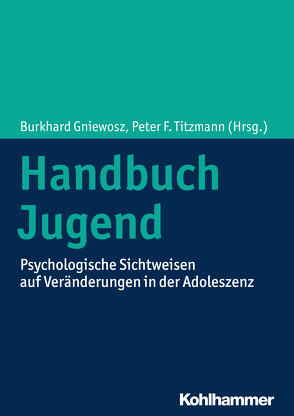
Young people face various biological, psychological and social changes - during a phase of life in which major decisions affecting their future lives and careers are being made.
This book presents the current state of research on young adulthood in a comprehensible way and explains the developments that take place during this formative period of life. The book is divided into five major topics, which provide a comprehensive overview of the major aspects involved that have been discussed academically. Initially, there is a glance at the biological foundations, followed by a discussion of the influence of social environments (family, friends and school) and of the media. The third part is concerned with important goals in young people=s development: forming an identity, developing moral ideas and learning basic competences (choosing a profession). The last two sections discuss social topics such as migration, political socialization and important developmental problems (including eating disturbances, ADHS, substance abuse), as well as options for prevention and approaches to intervention.
Aktualisiert: 2023-06-30
Autor:
Jens B. Asendorpf,
Andreas Beelmann,
Jens Blechert,
Anja Blumenthal,
Carolin Braun,
Viola Braun,
Leonard Bruckmann,
Marlis Buchmann,
Fatma Celik,
Anne Deiglmayr,
Katharina Eckstein,
Luciano Gasser,
Kiaras Gharabaghi,
Burkhard Gniewosz,
Verena Gralke,
Bettina Hannover,
Alexandra Iwanski,
Linda Juang,
Michael Kaess,
Julian Koenig,
Laura König,
Stephanie Lichtenfeld,
Marko Lüftenegger,
Claudia Mähler,
Tina Malti,
Hannah Margraf,
Sabine Maur,
Adrian Meule,
Gerhild Nieding,
Peter Noack,
Boris Orth,
Martin Pinquart,
Fritz Podewski,
Theda Radtke,
Julia Reichenberger,
Olaf Reis,
Lennart Schalk,
Herbert Scheithauer,
Anne Schmidt,
Barbara Schober,
Urte Scholz,
Elke Schroeder,
Kirsten Schuchardt,
Christina Schwenck,
Inge Seiffge-Krenke,
Christiane Spiel,
Christoph Steinebach,
Annekatrin Steinhoff,
Elsbeth Stern,
Peter F. Titzmann,
Jürgen Töppich,
Sabine Walper,
Stephan Warncke,
Karina Weichold,
Sarah Weigelt,
Ilka Wolter,
Lysann Zander,
Esther Ziegler,
Peter Zimmermann
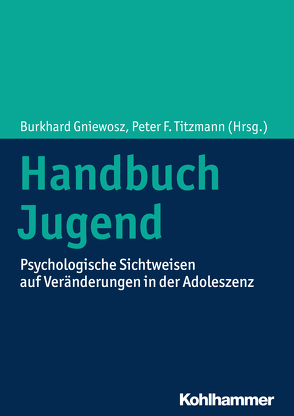
Young people face various biological, psychological and social changes - during a phase of life in which major decisions affecting their future lives and careers are being made.
This book presents the current state of research on young adulthood in a comprehensible way and explains the developments that take place during this formative period of life. The book is divided into five major topics, which provide a comprehensive overview of the major aspects involved that have been discussed academically. Initially, there is a glance at the biological foundations, followed by a discussion of the influence of social environments (family, friends and school) and of the media. The third part is concerned with important goals in young people=s development: forming an identity, developing moral ideas and learning basic competences (choosing a profession). The last two sections discuss social topics such as migration, political socialization and important developmental problems (including eating disturbances, ADHS, substance abuse), as well as options for prevention and approaches to intervention.
Aktualisiert: 2023-06-30
Autor:
Jens B. Asendorpf,
Andreas Beelmann,
Jens Blechert,
Anja Blumenthal,
Carolin Braun,
Viola Braun,
Leonard Bruckmann,
Marlis Buchmann,
Fatma Celik,
Anne Deiglmayr,
Katharina Eckstein,
Luciano Gasser,
Kiaras Gharabaghi,
Burkhard Gniewosz,
Verena Gralke,
Bettina Hannover,
Alexandra Iwanski,
Linda Juang,
Michael Kaess,
Julian Koenig,
Laura König,
Stephanie Lichtenfeld,
Marko Lüftenegger,
Claudia Mähler,
Tina Malti,
Hannah Margraf,
Sabine Maur,
Adrian Meule,
Gerhild Nieding,
Peter Noack,
Boris Orth,
Martin Pinquart,
Fritz Podewski,
Theda Radtke,
Julia Reichenberger,
Olaf Reis,
Lennart Schalk,
Herbert Scheithauer,
Anne Schmidt,
Barbara Schober,
Urte Scholz,
Elke Schroeder,
Kirsten Schuchardt,
Christina Schwenck,
Inge Seiffge-Krenke,
Christiane Spiel,
Christoph Steinebach,
Annekatrin Steinhoff,
Elsbeth Stern,
Peter F. Titzmann,
Jürgen Töppich,
Sabine Walper,
Stephan Warncke,
Karina Weichold,
Sarah Weigelt,
Ilka Wolter,
Lysann Zander,
Esther Ziegler,
Peter Zimmermann
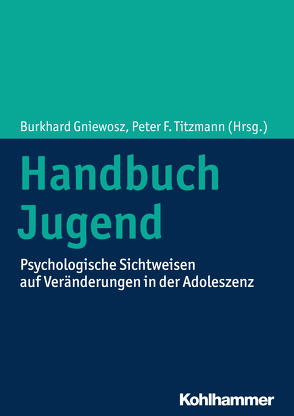
Young people face various biological, psychological and social changes - during a phase of life in which major decisions affecting their future lives and careers are being made.
This book presents the current state of research on young adulthood in a comprehensible way and explains the developments that take place during this formative period of life. The book is divided into five major topics, which provide a comprehensive overview of the major aspects involved that have been discussed academically. Initially, there is a glance at the biological foundations, followed by a discussion of the influence of social environments (family, friends and school) and of the media. The third part is concerned with important goals in young people=s development: forming an identity, developing moral ideas and learning basic competences (choosing a profession). The last two sections discuss social topics such as migration, political socialization and important developmental problems (including eating disturbances, ADHS, substance abuse), as well as options for prevention and approaches to intervention.
Aktualisiert: 2023-06-30
Autor:
Jens B. Asendorpf,
Andreas Beelmann,
Jens Blechert,
Anja Blumenthal,
Carolin Braun,
Viola Braun,
Leonard Bruckmann,
Marlis Buchmann,
Fatma Celik,
Anne Deiglmayr,
Katharina Eckstein,
Luciano Gasser,
Kiaras Gharabaghi,
Burkhard Gniewosz,
Verena Gralke,
Bettina Hannover,
Alexandra Iwanski,
Linda Juang,
Michael Kaess,
Julian Koenig,
Laura König,
Stephanie Lichtenfeld,
Marko Lüftenegger,
Claudia Mähler,
Tina Malti,
Hannah Margraf,
Sabine Maur,
Adrian Meule,
Gerhild Nieding,
Peter Noack,
Boris Orth,
Martin Pinquart,
Fritz Podewski,
Theda Radtke,
Julia Reichenberger,
Olaf Reis,
Lennart Schalk,
Herbert Scheithauer,
Anne Schmidt,
Barbara Schober,
Urte Scholz,
Elke Schroeder,
Kirsten Schuchardt,
Christina Schwenck,
Inge Seiffge-Krenke,
Christiane Spiel,
Christoph Steinebach,
Annekatrin Steinhoff,
Elsbeth Stern,
Peter F. Titzmann,
Jürgen Töppich,
Sabine Walper,
Stephan Warncke,
Karina Weichold,
Sarah Weigelt,
Ilka Wolter,
Lysann Zander,
Esther Ziegler,
Peter Zimmermann
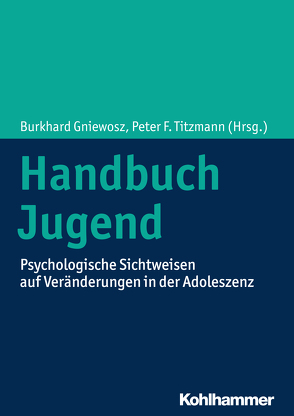
Young people face various biological, psychological and social changes - during a phase of life in which major decisions affecting their future lives and careers are being made.
This book presents the current state of research on young adulthood in a comprehensible way and explains the developments that take place during this formative period of life. The book is divided into five major topics, which provide a comprehensive overview of the major aspects involved that have been discussed academically. Initially, there is a glance at the biological foundations, followed by a discussion of the influence of social environments (family, friends and school) and of the media. The third part is concerned with important goals in young people=s development: forming an identity, developing moral ideas and learning basic competences (choosing a profession). The last two sections discuss social topics such as migration, political socialization and important developmental problems (including eating disturbances, ADHS, substance abuse), as well as options for prevention and approaches to intervention.
Aktualisiert: 2023-06-22
Autor:
Jens B. Asendorpf,
Andreas Beelmann,
Jens Blechert,
Anja Blumenthal,
Carolin Braun,
Viola Braun,
Leonard Bruckmann,
Marlis Buchmann,
Fatma Celik,
Anne Deiglmayr,
Katharina Eckstein,
Luciano Gasser,
Kiaras Gharabaghi,
Burkhard Gniewosz,
Verena Gralke,
Bettina Hannover,
Alexandra Iwanski,
Linda Juang,
Michael Kaess,
Julian Koenig,
Laura König,
Stephanie Lichtenfeld,
Marko Lüftenegger,
Claudia Mähler,
Tina Malti,
Hannah Margraf,
Sabine Maur,
Adrian Meule,
Gerhild Nieding,
Peter Noack,
Boris Orth,
Martin Pinquart,
Fritz Podewski,
Theda Radtke,
Julia Reichenberger,
Olaf Reis,
Lennart Schalk,
Herbert Scheithauer,
Anne Schmidt,
Barbara Schober,
Urte Scholz,
Elke Schroeder,
Kirsten Schuchardt,
Christina Schwenck,
Inge Seiffge-Krenke,
Christiane Spiel,
Christoph Steinebach,
Annekatrin Steinhoff,
Elsbeth Stern,
Peter F. Titzmann,
Jürgen Töppich,
Sabine Walper,
Stephan Warncke,
Karina Weichold,
Sarah Weigelt,
Ilka Wolter,
Lysann Zander,
Esther Ziegler,
Peter Zimmermann
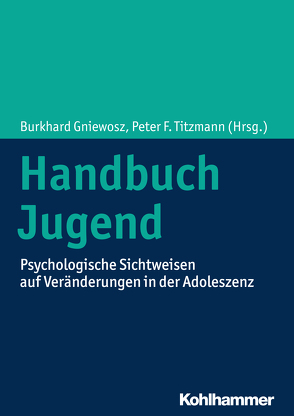
Young people face various biological, psychological and social changes - during a phase of life in which major decisions affecting their future lives and careers are being made.
This book presents the current state of research on young adulthood in a comprehensible way and explains the developments that take place during this formative period of life. The book is divided into five major topics, which provide a comprehensive overview of the major aspects involved that have been discussed academically. Initially, there is a glance at the biological foundations, followed by a discussion of the influence of social environments (family, friends and school) and of the media. The third part is concerned with important goals in young people=s development: forming an identity, developing moral ideas and learning basic competences (choosing a profession). The last two sections discuss social topics such as migration, political socialization and important developmental problems (including eating disturbances, ADHS, substance abuse), as well as options for prevention and approaches to intervention.
Aktualisiert: 2023-06-22
Autor:
Jens B. Asendorpf,
Andreas Beelmann,
Jens Blechert,
Anja Blumenthal,
Carolin Braun,
Viola Braun,
Leonard Bruckmann,
Marlis Buchmann,
Fatma Celik,
Anne Deiglmayr,
Katharina Eckstein,
Luciano Gasser,
Kiaras Gharabaghi,
Burkhard Gniewosz,
Verena Gralke,
Bettina Hannover,
Alexandra Iwanski,
Linda Juang,
Michael Kaess,
Julian Koenig,
Laura König,
Stephanie Lichtenfeld,
Marko Lüftenegger,
Claudia Mähler,
Tina Malti,
Hannah Margraf,
Sabine Maur,
Adrian Meule,
Gerhild Nieding,
Peter Noack,
Boris Orth,
Martin Pinquart,
Fritz Podewski,
Theda Radtke,
Julia Reichenberger,
Olaf Reis,
Lennart Schalk,
Herbert Scheithauer,
Anne Schmidt,
Barbara Schober,
Urte Scholz,
Elke Schroeder,
Kirsten Schuchardt,
Christina Schwenck,
Inge Seiffge-Krenke,
Christiane Spiel,
Christoph Steinebach,
Annekatrin Steinhoff,
Elsbeth Stern,
Peter F. Titzmann,
Jürgen Töppich,
Sabine Walper,
Stephan Warncke,
Karina Weichold,
Sarah Weigelt,
Ilka Wolter,
Lysann Zander,
Esther Ziegler,
Peter Zimmermann
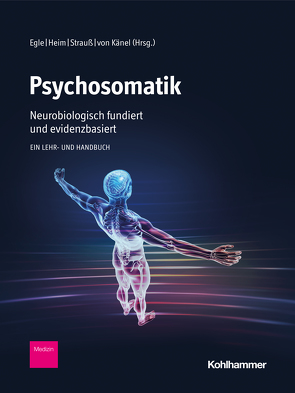
A wealth of new findings in the fields of neurobiology and molecular biology, epigenetics and developmental psychology in the field of stress research have led to a far-reaching paradigm shift in psychosomatic medicine during the last 10 years. Traditional theoretical models of various schools of psychotherapy on the development and treatment of numerous diseases with physical cardinal symptoms have consequently lost their significance. The present work begins with 21 chapters providing a current stocktaking of the scientifically proven biopsychosocial foundations of this new psychosomatics, and then in a further 68 chapters it presents the various implications for the diagnosis and treatment of numerous diseases in the different medical disciplines, based on the findings of basic research. These are supplemented by articles on social medicine, assessment and prevention.
Aktualisiert: 2023-06-15
Autor:
Laura Anderegg,
Selma Aybek,
Sarah T. Ballach,
Karl-Jürgen Bär,
Jürgen Bengel,
Elisabeth Binder,
Cornelia Bittmann,
Oliver Bohlen,
Jessica Bosch,
Peer Briken,
Emily Brindley,
Timo Brockmeyer,
Victoria Lucia Cammann,
Hannah Cheng,
Marianna Di Chiara,
Felix de Courbière,
Tatjana Crönlein,
Felix Dammering,
Monika Daubländer,
Claus Derra,
Beate Ditzen,
Florence Dorr,
Marie-Luise Ecker-Egle,
Ulrich T Egle,
Niklaus Egloff,
Ulrike Ehlert,
Sonja Entringer,
Elissa Epel,
Yesim Erim,
Hermann Faller,
Anja C. Feneberg,
Serena Fiacco,
Johannes B. Finke,
Felix Fischer,
Susanne Fischer,
Magdalena Flatscher-Thöni,
Fritjof von Franqué,
Matthias Franz,
Harald J Freyberger,
Hans-Christoph Friederich,
Ingo Froboese,
Bernd Fromm,
Jens Gaab,
Werner Geigges,
Alexander L. Gerlach,
Ulfried Geuter,
Uwe Gieler,
Ute Katharina Gitzen,
Lutz Goetzmann,
Stefan Gold,
Harald Gündel,
Alfons Hamm,
Gregor Hasler,
Winfried Häuser,
Tobias Hecker,
Thomas Heidenreich,
Christine Heim,
Beate Herpertz-Dahlmann,
Anja Hilbert,
Thomas Hillecke,
Sebastian C. Holst,
Anita Horn,
Frank Jacobi,
Jochen Jordan,
George J. Kahaly,
Peter Fritz Keller,
Olga Klimecki,
Nina Knoll,
Andrea Knop,
Anna Katharina Koch,
Julian Koenig,
Volker Köllner,
Alexander Konnopka,
Peter C. Konturek,
Thula Koops,
Rachel Kosciusko,
Peter M. Kreuzer,
Johannes Kruse,
Karl Heinz Ladwig,
Claas Lahmann,
Astrid Lampe,
Hans-Peter Landolt,
Richard D. Lane,
Berthold Langguth,
Eike Langheim,
Jost Langhorst,
Peter Langner,
Claudia Lazarides,
Nadine Lehnen,
Astrid Lehner,
Boris Leithäuser,
Claas Lendt,
Denise Lenski,
Frank Leweke,
Karoline Lukaschek,
Wolfgang Lutz,
Andreas Maercker,
Alexandra Martin,
Anja Mehnert-Theuerkauf,
Laura Mernone,
Johannes Michalak,
Dorothee von Moreau,
Urs M. Nater,
Tobias Nolte,
Emilou Noser,
Silvia Oddo-Sommerfeld,
Christian Otte,
Ritambhara Pathak,
Achim Peters,
Eva Peters,
Katharina Peters,
Anke Petersen,
Anna Pohl,
Roman Prem,
Hans-Christian Puls,
Katharina Radziej,
Meera Rajput,
Antje Rauers,
Günter Reich,
Viktoria Ritter,
Thomas Ritz,
Volker Roelcke,
Frank Röhricht,
Matthias Rose,
Michael Rufer,
Hartmut Schächinger,
Rainer Schäfert,
Henning Schauenburg,
Martin Schecklmann,
Maren Schick,
Charlotte Lisa Schmidt,
Jennifer Schmidt,
Jessica Schoch-Ruppen,
Christian Schubert,
Stefan R. Schweinberger,
Johannes Siegrist,
Joe Simon,
Timo Slotta,
Ryan Smith,
Sarah Sommerlad,
Ulrich Stangier,
Jennifer Steel,
Timothy J. Strauman,
Bernhard Strauß,
Konrad Andreas Szawan,
Christian Templin,
Jelena Templin-Ghadri,
Veronika Vielsmeier,
Heiner Vogel,
Roland von Känel,
Isi Wang,
Claudia Welte-Jzyk,
Gabriele Werner-Felmayer,
Esther Werth,
Bernhard Widder,
Christiane Wilke,
Sibylle Maria Winter,
Tewes Wischmann,
Alexander Wormit,
Stephan Zipfel,
Martina de Zwaan
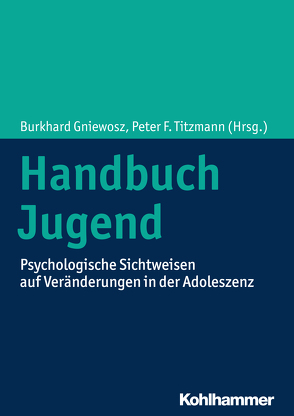
Young people face various biological, psychological and social changes - during a phase of life in which major decisions affecting their future lives and careers are being made.
This book presents the current state of research on young adulthood in a comprehensible way and explains the developments that take place during this formative period of life. The book is divided into five major topics, which provide a comprehensive overview of the major aspects involved that have been discussed academically. Initially, there is a glance at the biological foundations, followed by a discussion of the influence of social environments (family, friends and school) and of the media. The third part is concerned with important goals in young people=s development: forming an identity, developing moral ideas and learning basic competences (choosing a profession). The last two sections discuss social topics such as migration, political socialization and important developmental problems (including eating disturbances, ADHS, substance abuse), as well as options for prevention and approaches to intervention.
Aktualisiert: 2023-06-15
Autor:
Jens B. Asendorpf,
Andreas Beelmann,
Jens Blechert,
Anja Blumenthal,
Carolin Braun,
Viola Braun,
Leonard Bruckmann,
Marlis Buchmann,
Fatma Celik,
Anne Deiglmayr,
Katharina Eckstein,
Luciano Gasser,
Kiaras Gharabaghi,
Burkhard Gniewosz,
Verena Gralke,
Bettina Hannover,
Alexandra Iwanski,
Linda Juang,
Michael Kaess,
Julian Koenig,
Laura König,
Stephanie Lichtenfeld,
Marko Lüftenegger,
Claudia Mähler,
Tina Malti,
Hannah Margraf,
Sabine Maur,
Adrian Meule,
Gerhild Nieding,
Peter Noack,
Boris Orth,
Martin Pinquart,
Fritz Podewski,
Theda Radtke,
Theresa Reichenberger,
Olaf Reis,
Lennart Schalk,
Herbert Scheithauer,
Anne Schmidt,
Barbara Schober,
Urte Scholz,
Elke Schroeder,
Kirsten Schuchardt,
Christina Schwenck,
Inge Seiffge-Krenke,
Christiane Spiel,
Christoph Steinebach,
Annekatrin Steinhoff,
Elsbeth Stern,
Peter F. Titzmann,
Jürgen Töppich,
Sabine Walper,
Stephan Warncke,
Karina Weichold,
Sarah Weigelt,
Ilka Wolter,
Lysann Zander,
Esther Ziegler,
Peter Zimmermann

Young people face various biological, psychological and social changes - during a phase of life in which major decisions affecting their future lives and careers are being made.
This book presents the current state of research on young adulthood in a comprehensible way and explains the developments that take place during this formative period of life. The book is divided into five major topics, which provide a comprehensive overview of the major aspects involved that have been discussed academically. Initially, there is a glance at the biological foundations, followed by a discussion of the influence of social environments (family, friends and school) and of the media. The third part is concerned with important goals in young people=s development: forming an identity, developing moral ideas and learning basic competences (choosing a profession). The last two sections discuss social topics such as migration, political socialization and important developmental problems (including eating disturbances, ADHS, substance abuse), as well as options for prevention and approaches to intervention.
Aktualisiert: 2023-06-07
Autor:
Jens B. Asendorpf,
Andreas Beelmann,
Jens Blechert,
Anja Blumenthal,
Carolin Braun,
Viola Braun,
Leonard Bruckmann,
Marlis Buchmann,
Fatma Celik,
Anne Deiglmayr,
Katharina Eckstein,
Luciano Gasser,
Kiaras Gharabaghi,
Burkhard Gniewosz,
Verena Gralke,
Bettina Hannover,
Alexandra Iwanski,
Linda Juang,
Michael Kaess,
Julian Koenig,
Laura König,
Stephanie Lichtenfeld,
Marko Lüftenegger,
Claudia Mähler,
Tina Malti,
Hannah Margraf,
Sabine Maur,
Adrian Meule,
Gerhild Nieding,
Peter Noack,
Boris Orth,
Martin Pinquart,
Fritz Podewski,
Theda Radtke,
Theresa Reichenberger,
Olaf Reis,
Lennart Schalk,
Herbert Scheithauer,
Anne Schmidt,
Barbara Schober,
Urte Scholz,
Elke Schroeder,
Kirsten Schuchardt,
Christina Schwenck,
Inge Seiffge-Krenke,
Christiane Spiel,
Christoph Steinebach,
Annekatrin Steinhoff,
Elsbeth Stern,
Peter F. Titzmann,
Jürgen Töppich,
Sabine Walper,
Stephan Warncke,
Karina Weichold,
Sarah Weigelt,
Ilka Wolter,
Lysann Zander,
Esther Ziegler,
Peter Zimmermann
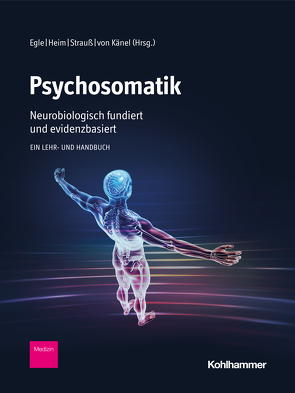
A wealth of new findings in the fields of neurobiology and molecular biology, epigenetics and developmental psychology in the field of stress research have led to a far-reaching paradigm shift in psychosomatic medicine during the last 10 years. Traditional theoretical models of various schools of psychotherapy on the development and treatment of numerous diseases with physical cardinal symptoms have consequently lost their significance. The present work begins with 21 chapters providing a current stocktaking of the scientifically proven biopsychosocial foundations of this new psychosomatics, and then in a further 68 chapters it presents the various implications for the diagnosis and treatment of numerous diseases in the different medical disciplines, based on the findings of basic research. These are supplemented by articles on social medicine, assessment and prevention.
Aktualisiert: 2023-06-07
Autor:
Laura Anderegg,
Selma Aybek,
Sarah T. Ballach,
Karl-Jürgen Bär,
Jürgen Bengel,
Elisabeth Binder,
Cornelia Bittmann,
Oliver Bohlen,
Jessica Bosch,
Peer Briken,
Emily Brindley,
Timo Brockmeyer,
Victoria Lucia Cammann,
Hannah Cheng,
Marianna Di Chiara,
Felix de Courbière,
Tatjana Crönlein,
Felix Dammering,
Monika Daubländer,
Claus Derra,
Beate Ditzen,
Florence Dorr,
Marie-Luise Ecker-Egle,
Ulrich T Egle,
Niklaus Egloff,
Ulrike Ehlert,
Sonja Entringer,
Elissa Epel,
Yesim Erim,
Hermann Faller,
Anja C. Feneberg,
Serena Fiacco,
Johannes B. Finke,
Felix Fischer,
Susanne Fischer,
Magdalena Flatscher-Thöni,
Fritjof von Franqué,
Matthias Franz,
Harald J Freyberger,
Hans-Christoph Friederich,
Ingo Froboese,
Bernd Fromm,
Jens Gaab,
Werner Geigges,
Alexander L. Gerlach,
Ulfried Geuter,
Uwe Gieler,
Ute Katharina Gitzen,
Lutz Goetzmann,
Stefan Gold,
Harald Gündel,
Alfons Hamm,
Gregor Hasler,
Winfried Häuser,
Tobias Hecker,
Thomas Heidenreich,
Christine Heim,
Beate Herpertz-Dahlmann,
Anja Hilbert,
Thomas Hillecke,
Sebastian C. Holst,
Anita Horn,
Frank Jacobi,
Jochen Jordan,
George J. Kahaly,
Peter Fritz Keller,
Olga Klimecki,
Nina Knoll,
Andrea Knop,
Anna Katharina Koch,
Julian Koenig,
Volker Köllner,
Alexander Konnopka,
Peter C. Konturek,
Thula Koops,
Rachel Kosciusko,
Peter M. Kreuzer,
Johannes Kruse,
Karl Heinz Ladwig,
Claas Lahmann,
Astrid Lampe,
Hans-Peter Landolt,
Richard D. Lane,
Berthold Langguth,
Eike Langheim,
Jost Langhorst,
Peter Langner,
Claudia Lazarides,
Nadine Lehnen,
Astrid Lehner,
Boris Leithäuser,
Claas Lendt,
Denise Lenski,
Frank Leweke,
Karoline Lukaschek,
Wolfgang Lutz,
Andreas Maercker,
Alexandra Martin,
Anja Mehnert-Theuerkauf,
Laura Mernone,
Johannes Michalak,
Dorothee von Moreau,
Urs M. Nater,
Tobias Nolte,
Emilou Noser,
Silvia Oddo-Sommerfeld,
Christian Otte,
Ritambhara Pathak,
Achim Peters,
Eva Peters,
Katharina Peters,
Anke Petersen,
Anna Pohl,
Roman Prem,
Hans-Christian Puls,
Katharina Radziej,
Meera Rajput,
Antje Rauers,
Günter Reich,
Viktoria Ritter,
Thomas Ritz,
Volker Roelcke,
Frank Röhricht,
Matthias Rose,
Michael Rufer,
Hartmut Schächinger,
Rainer Schäfert,
Henning Schauenburg,
Martin Schecklmann,
Maren Schick,
Charlotte Lisa Schmidt,
Jennifer Schmidt,
Jessica Schoch-Ruppen,
Christian Schubert,
Stefan R. Schweinberger,
Johannes Siegrist,
Joe Simon,
Timo Slotta,
Ryan Smith,
Sarah Sommerlad,
Ulrich Stangier,
Jennifer Steel,
Timothy J. Strauman,
Bernhard Strauß,
Konrad Andreas Szawan,
Christian Templin,
Jelena Templin-Ghadri,
Veronika Vielsmeier,
Heiner Vogel,
Roland von Känel,
Isi Wang,
Claudia Welte-Jzyk,
Gabriele Werner-Felmayer,
Esther Werth,
Bernhard Widder,
Christiane Wilke,
Sibylle Maria Winter,
Tewes Wischmann,
Alexander Wormit,
Stephan Zipfel,
Martina de Zwaan
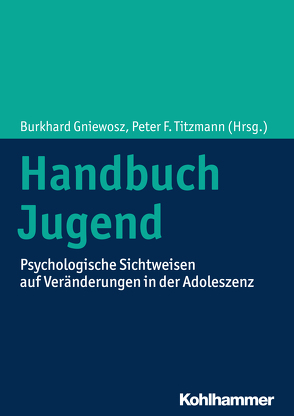
Young people face various biological, psychological and social changes - during a phase of life in which major decisions affecting their future lives and careers are being made.
This book presents the current state of research on young adulthood in a comprehensible way and explains the developments that take place during this formative period of life. The book is divided into five major topics, which provide a comprehensive overview of the major aspects involved that have been discussed academically. Initially, there is a glance at the biological foundations, followed by a discussion of the influence of social environments (family, friends and school) and of the media. The third part is concerned with important goals in young people=s development: forming an identity, developing moral ideas and learning basic competences (choosing a profession). The last two sections discuss social topics such as migration, political socialization and important developmental problems (including eating disturbances, ADHS, substance abuse), as well as options for prevention and approaches to intervention.
Aktualisiert: 2023-06-01
Autor:
Jens B. Asendorpf,
Andreas Beelmann,
Jens Blechert,
Anja Blumenthal,
Carolin Braun,
Viola Braun,
Leonard Bruckmann,
Marlis Buchmann,
Fatma Celik,
Anne Deiglmayr,
Katharina Eckstein,
Luciano Gasser,
Kiaras Gharabaghi,
Burkhard Gniewosz,
Verena Gralke,
Bettina Hannover,
Alexandra Iwanski,
Linda Juang,
Michael Kaess,
Julian Koenig,
Laura König,
Stephanie Lichtenfeld,
Marko Lüftenegger,
Claudia Mähler,
Tina Malti,
Hannah Margraf,
Sabine Maur,
Adrian Meule,
Gerhild Nieding,
Peter Noack,
Boris Orth,
Martin Pinquart,
Fritz Podewski,
Theda Radtke,
Theresa Reichenberger,
Olaf Reis,
Lennart Schalk,
Herbert Scheithauer,
Anne Schmidt,
Barbara Schober,
Urte Scholz,
Elke Schroeder,
Kirsten Schuchardt,
Christina Schwenck,
Inge Seiffge-Krenke,
Christiane Spiel,
Christoph Steinebach,
Annekatrin Steinhoff,
Elsbeth Stern,
Peter F. Titzmann,
Jürgen Töppich,
Sabine Walper,
Stephan Warncke,
Karina Weichold,
Sarah Weigelt,
Ilka Wolter,
Lysann Zander,
Esther Ziegler,
Peter Zimmermann
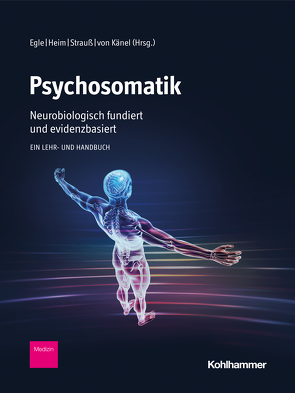
A wealth of new findings in the fields of neurobiology and molecular biology, epigenetics and developmental psychology in the field of stress research have led to a far-reaching paradigm shift in psychosomatic medicine during the last 10 years. Traditional theoretical models of various schools of psychotherapy on the development and treatment of numerous diseases with physical cardinal symptoms have consequently lost their significance. The present work begins with 21 chapters providing a current stocktaking of the scientifically proven biopsychosocial foundations of this new psychosomatics, and then in a further 68 chapters it presents the various implications for the diagnosis and treatment of numerous diseases in the different medical disciplines, based on the findings of basic research. These are supplemented by articles on social medicine, assessment and prevention.
Aktualisiert: 2023-06-01
Autor:
Laura Anderegg,
Selma Aybek,
Sarah T. Ballach,
Karl-Jürgen Bär,
Jürgen Bengel,
Elisabeth Binder,
Cornelia Bittmann,
Oliver Bohlen,
Jessica Bosch,
Peer Briken,
Emily Brindley,
Timo Brockmeyer,
Victoria Lucia Cammann,
Hannah Cheng,
Marianna Di Chiara,
Felix de Courbière,
Tatjana Crönlein,
Felix Dammering,
Monika Daubländer,
Claus Derra,
Beate Ditzen,
Florence Dorr,
Marie-Luise Ecker-Egle,
Ulrich T Egle,
Niklaus Egloff,
Ulrike Ehlert,
Sonja Entringer,
Elissa Epel,
Yesim Erim,
Hermann Faller,
Anja C. Feneberg,
Serena Fiacco,
Johannes B. Finke,
Felix Fischer,
Susanne Fischer,
Magdalena Flatscher-Thöni,
Fritjof von Franqué,
Matthias Franz,
Harald J Freyberger,
Hans-Christoph Friederich,
Ingo Froboese,
Bernd Fromm,
Jens Gaab,
Werner Geigges,
Alexander L. Gerlach,
Ulfried Geuter,
Uwe Gieler,
Ute Katharina Gitzen,
Lutz Goetzmann,
Stefan Gold,
Harald Gündel,
Alfons Hamm,
Gregor Hasler,
Winfried Häuser,
Tobias Hecker,
Thomas Heidenreich,
Christine Heim,
Beate Herpertz-Dahlmann,
Anja Hilbert,
Thomas Hillecke,
Sebastian C. Holst,
Anita Horn,
Frank Jacobi,
Jochen Jordan,
George J. Kahaly,
Peter Fritz Keller,
Olga Klimecki,
Nina Knoll,
Andrea Knop,
Anna Katharina Koch,
Julian Koenig,
Volker Köllner,
Alexander Konnopka,
Peter C. Konturek,
Thula Koops,
Rachel Kosciusko,
Peter M. Kreuzer,
Johannes Kruse,
Karl Heinz Ladwig,
Claas Lahmann,
Astrid Lampe,
Hans-Peter Landolt,
Richard D. Lane,
Berthold Langguth,
Eike Langheim,
Jost Langhorst,
Peter Langner,
Claudia Lazarides,
Nadine Lehnen,
Astrid Lehner,
Boris Leithäuser,
Claas Lendt,
Denise Lenski,
Frank Leweke,
Karoline Lukaschek,
Wolfgang Lutz,
Andreas Maercker,
Alexandra Martin,
Anja Mehnert-Theuerkauf,
Laura Mernone,
Johannes Michalak,
Dorothee von Moreau,
Urs M. Nater,
Tobias Nolte,
Emilou Noser,
Silvia Oddo-Sommerfeld,
Christian Otte,
Ritambhara Pathak,
Achim Peters,
Eva Peters,
Katharina Peters,
Anke Petersen,
Anna Pohl,
Roman Prem,
Hans-Christian Puls,
Katharina Radziej,
Meera Rajput,
Antje Rauers,
Günter Reich,
Viktoria Ritter,
Thomas Ritz,
Volker Roelcke,
Frank Röhricht,
Matthias Rose,
Michael Rufer,
Hartmut Schächinger,
Rainer Schäfert,
Henning Schauenburg,
Martin Schecklmann,
Maren Schick,
Charlotte Lisa Schmidt,
Jennifer Schmidt,
Jessica Schoch-Ruppen,
Christian Schubert,
Stefan R. Schweinberger,
Johannes Siegrist,
Joe Simon,
Timo Slotta,
Ryan Smith,
Sarah Sommerlad,
Ulrich Stangier,
Jennifer Steel,
Timothy J. Strauman,
Bernhard Strauß,
Konrad Andreas Szawan,
Christian Templin,
Jelena Templin-Ghadri,
Veronika Vielsmeier,
Heiner Vogel,
Roland von Känel,
Isi Wang,
Claudia Welte-Jzyk,
Gabriele Werner-Felmayer,
Esther Werth,
Bernhard Widder,
Christiane Wilke,
Sibylle Maria Winter,
Tewes Wischmann,
Alexander Wormit,
Stephan Zipfel,
Martina de Zwaan
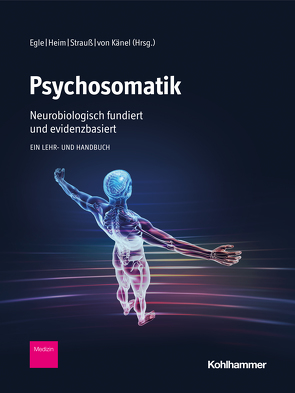
A wealth of new findings in the fields of neurobiology and molecular biology, epigenetics and developmental psychology in the field of stress research have led to a far-reaching paradigm shift in psychosomatic medicine during the last 10 years. Traditional theoretical models of various schools of psychotherapy on the development and treatment of numerous diseases with physical cardinal symptoms have consequently lost their significance. The present work begins with 21 chapters providing a current stocktaking of the scientifically proven biopsychosocial foundations of this new psychosomatics, and then in a further 68 chapters it presents the various implications for the diagnosis and treatment of numerous diseases in the different medical disciplines, based on the findings of basic research. These are supplemented by articles on social medicine, assessment and prevention.
Aktualisiert: 2023-05-25
Autor:
Laura Anderegg,
Selma Aybek,
Sarah T. Ballach,
Karl-Jürgen Bär,
Jürgen Bengel,
Elisabeth Binder,
Cornelia Bittmann,
Oliver Bohlen,
Jessica Bosch,
Peer Briken,
Emily Brindley,
Timo Brockmeyer,
Victoria Lucia Cammann,
Hannah Cheng,
Marianna Di Chiara,
Felix de Courbière,
Tatjana Crönlein,
Felix Dammering,
Monika Daubländer,
Claus Derra,
Beate Ditzen,
Florence Dorr,
Marie-Luise Ecker-Egle,
Ulrich T Egle,
Niklaus Egloff,
Ulrike Ehlert,
Sonja Entringer,
Elissa Epel,
Yesim Erim,
Hermann Faller,
Anja C. Feneberg,
Serena Fiacco,
Johannes B. Finke,
Felix Fischer,
Susanne Fischer,
Magdalena Flatscher-Thöni,
Fritjof von Franqué,
Matthias Franz,
Harald J Freyberger,
Hans-Christoph Friederich,
Ingo Froboese,
Bernd Fromm,
Jens Gaab,
Werner Geigges,
Alexander L. Gerlach,
Ulfried Geuter,
Uwe Gieler,
Ute Katharina Gitzen,
Lutz Goetzmann,
Stefan Gold,
Harald Gündel,
Alfons Hamm,
Gregor Hasler,
Winfried Häuser,
Tobias Hecker,
Thomas Heidenreich,
Christine Heim,
Beate Herpertz-Dahlmann,
Anja Hilbert,
Thomas Hillecke,
Sebastian C. Holst,
Anita Horn,
Frank Jacobi,
Jochen Jordan,
George J. Kahaly,
Peter Fritz Keller,
Olga Klimecki,
Nina Knoll,
Andrea Knop,
Anna Katharina Koch,
Julian Koenig,
Volker Köllner,
Alexander Konnopka,
Peter C. Konturek,
Thula Koops,
Rachel Kosciusko,
Peter M. Kreuzer,
Johannes Kruse,
Karl Heinz Ladwig,
Claas Lahmann,
Astrid Lampe,
Hans-Peter Landolt,
Richard D. Lane,
Berthold Langguth,
Eike Langheim,
Jost Langhorst,
Peter Langner,
Claudia Lazarides,
Nadine Lehnen,
Astrid Lehner,
Boris Leithäuser,
Claas Lendt,
Denise Lenski,
Frank Leweke,
Karoline Lukaschek,
Wolfgang Lutz,
Andreas Maercker,
Alexandra Martin,
Anja Mehnert-Theuerkauf,
Laura Mernone,
Johannes Michalak,
Dorothee von Moreau,
Urs M. Nater,
Tobias Nolte,
Emilou Noser,
Silvia Oddo-Sommerfeld,
Christian Otte,
Ritambhara Pathak,
Achim Peters,
Eva Peters,
Katharina Peters,
Anke Petersen,
Anna Pohl,
Roman Prem,
Hans-Christian Puls,
Katharina Radziej,
Meera Rajput,
Antje Rauers,
Günter Reich,
Viktoria Ritter,
Thomas Ritz,
Volker Roelcke,
Frank Röhricht,
Matthias Rose,
Michael Rufer,
Hartmut Schächinger,
Rainer Schäfert,
Henning Schauenburg,
Martin Schecklmann,
Maren Schick,
Charlotte Lisa Schmidt,
Jennifer Schmidt,
Jessica Schoch-Ruppen,
Christian Schubert,
Stefan R. Schweinberger,
Johannes Siegrist,
Joe Simon,
Timo Slotta,
Ryan Smith,
Sarah Sommerlad,
Ulrich Stangier,
Jennifer Steel,
Timothy J. Strauman,
Bernhard Strauß,
Konrad Andreas Szawan,
Christian Templin,
Jelena Templin-Ghadri,
Veronika Vielsmeier,
Heiner Vogel,
Roland von Känel,
Isi Wang,
Claudia Welte-Jzyk,
Gabriele Werner-Felmayer,
Esther Werth,
Bernhard Widder,
Christiane Wilke,
Sibylle Maria Winter,
Tewes Wischmann,
Alexander Wormit,
Stephan Zipfel,
Martina de Zwaan
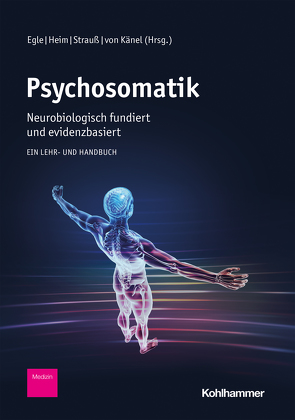
A wealth of new findings in the fields of neurobiology and molecular biology, epigenetics and developmental psychology in the field of stress research have led to a far-reaching paradigm shift in psychosomatic medicine during the last 10 years. Traditional theoretical models of various schools of psychotherapy on the development and treatment of numerous diseases with physical cardinal symptoms have consequently lost their significance. The present work begins with 21 chapters providing a current stocktaking of the scientifically proven biopsychosocial foundations of this new psychosomatics, and then in a further 68 chapters it presents the various implications for the diagnosis and treatment of numerous diseases in the different medical disciplines, based on the findings of basic research. These are supplemented by articles on social medicine, assessment and prevention.
Aktualisiert: 2023-05-03
Autor:
Laura Anderegg,
Selma Aybek,
Sarah T. Ballach,
Karl-Jürgen Bär,
Jürgen Bengel,
Elisabeth Binder,
Cornelia Bittmann,
Oliver Bohlen,
Jessica Bosch,
Peer Briken,
Emily Brindley,
Timo Brockmeyer,
Victoria Lucia Cammann,
Hannah Cheng,
Marianna Di Chiara,
Felix de Courbière,
Tatjana Crönlein,
Felix Dammering,
Monika Daubländer,
Claus Derra,
Beate Ditzen,
Florence Dorr,
Marie-Luise Ecker-Egle,
Ulrich T Egle,
Niklaus Egloff,
Ulrike Ehlert,
Sonja Entringer,
Elissa Epel,
Yesim Erim,
Hermann Faller,
Anja C. Feneberg,
Serena Fiacco,
Johannes B. Finke,
Felix Fischer,
Susanne Fischer,
Magdalena Flatscher-Thöni,
Fritjof von Franqué,
Matthias Franz,
Harald J Freyberger,
Hans-Christoph Friederich,
Ingo Froboese,
Bernd Fromm,
Jens Gaab,
Werner Geigges,
Alexander L. Gerlach,
Ulfried Geuter,
Uwe Gieler,
Ute Katharina Gitzen,
Lutz Goetzmann,
Stefan Gold,
Harald Gündel,
Alfons Hamm,
Gregor Hasler,
Winfried Häuser,
Tobias Hecker,
Thomas Heidenreich,
Christine Heim,
Beate Herpertz-Dahlmann,
Anja Hilbert,
Thomas Hillecke,
Sebastian C. Holst,
Anita Horn,
Frank Jacobi,
Jochen Jordan,
George J. Kahaly,
Roland von Känel,
Peter Fritz Keller,
Olga Klimecki,
Nina Knoll,
Andrea Knop,
Anna Katharina Koch,
Julian Koenig,
Volker Köllner,
Alexander Konnopka,
Peter C. Konturek,
Thula Koops,
Rachel Kosciusko,
Peter M. Kreuzer,
Johannes Kruse,
Karl Heinz Ladwig,
Claas Lahmann,
Astrid Lampe,
Hans-Peter Landolt,
Richard D. Lane,
Berthold Langguth,
Eike Langheim,
Jost Langhorst,
Peter Langner,
Claudia Lazarides,
Nadine Lehnen,
Astrid Lehner,
Boris Leithäuser,
Claas Lendt,
Denise Lenski,
Frank Leweke,
Karoline Lukaschek,
Wolfgang Lutz,
Andreas Maercker,
Alexandra Martin,
Anja Mehnert-Theuerkauf,
Laura Mernone,
Johannes Michalak,
Dorothee von Moreau,
Urs M. Nater,
Tobias Nolte,
Emilou Noser,
Silvia Oddo-Sommerfeld,
Christian Otte,
Ritambhara Pathak,
Achim Peters,
Eva Peters,
Katharina Peters,
Anke Petersen,
Anna Pohl,
Roman Prem,
Hans-Christian Puls,
Katharina Radziej,
Meera Rajput,
Antje Rauers,
Günter Reich,
Viktoria Ritter,
Thomas Ritz,
Volker Roelcke,
Frank Röhricht,
Matthias Rose,
Michael Rufer,
Hartmut Schächinger,
Rainer Schäfert,
Henning Schauenburg,
Martin Schecklmann,
Maren Schick,
Charlotte Lisa Schmidt,
Jennifer Schmidt,
Jessica Schoch-Ruppen,
Christian Schubert,
Stefan R. Schweinberger,
Johannes Siegrist,
Joe Simon,
Timo Slotta,
Ryan Smith,
Sarah Sommerlad,
Ulrich Stangier,
Jennifer Steel,
Timothy J. Strauman,
Bernhard Strauß,
Konrad Andreas Szawan,
Christian Templin,
Jelena Templin-Ghadri,
Veronika Vielsmeier,
Heiner Vogel,
Isi Wang,
Claudia Welte-Jzyk,
Gabriele Werner-Felmayer,
Esther Werth,
Bernhard Widder,
Christiane Wilke,
Sibylle Maria Winter,
Tewes Wischmann,
Alexander Wormit,
Stephan Zipfel,
Martina de Zwaan
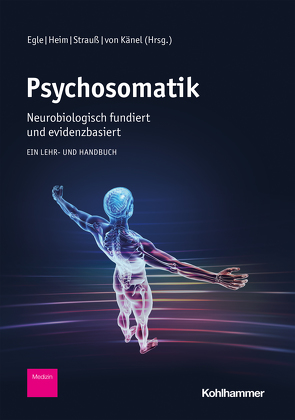
A wealth of new findings in the fields of neurobiology and molecular biology, epigenetics and developmental psychology in the field of stress research have led to a far-reaching paradigm shift in psychosomatic medicine during the last 10 years. Traditional theoretical models of various schools of psychotherapy on the development and treatment of numerous diseases with physical cardinal symptoms have consequently lost their significance. The present work begins with 21 chapters providing a current stocktaking of the scientifically proven biopsychosocial foundations of this new psychosomatics, and then in a further 68 chapters it presents the various implications for the diagnosis and treatment of numerous diseases in the different medical disciplines, based on the findings of basic research. These are supplemented by articles on social medicine, assessment and prevention.
Aktualisiert: 2023-05-03
Autor:
Laura Anderegg,
Selma Aybek,
Sarah T. Ballach,
Karl-Jürgen Bär,
Jürgen Bengel,
Elisabeth Binder,
Cornelia Bittmann,
Oliver Bohlen,
Jessica Bosch,
Peer Briken,
Emily Brindley,
Timo Brockmeyer,
Victoria Lucia Cammann,
Hannah Cheng,
Marianna Di Chiara,
Felix de Courbière,
Tatjana Crönlein,
Felix Dammering,
Monika Daubländer,
Claus Derra,
Beate Ditzen,
Florence Dorr,
Marie-Luise Ecker-Egle,
Ulrich T Egle,
Niklaus Egloff,
Ulrike Ehlert,
Sonja Entringer,
Elissa Epel,
Yesim Erim,
Hermann Faller,
Anja C. Feneberg,
Serena Fiacco,
Johannes B. Finke,
Felix Fischer,
Susanne Fischer,
Magdalena Flatscher-Thöni,
Fritjof von Franqué,
Matthias Franz,
Harald J Freyberger,
Hans-Christoph Friederich,
Ingo Froboese,
Bernd Fromm,
Jens Gaab,
Werner Geigges,
Alexander L. Gerlach,
Ulfried Geuter,
Uwe Gieler,
Ute Katharina Gitzen,
Lutz Goetzmann,
Stefan Gold,
Harald Gündel,
Alfons Hamm,
Gregor Hasler,
Winfried Häuser,
Tobias Hecker,
Thomas Heidenreich,
Christine Heim,
Beate Herpertz-Dahlmann,
Anja Hilbert,
Thomas Hillecke,
Sebastian C. Holst,
Anita Horn,
Frank Jacobi,
Jochen Jordan,
George J. Kahaly,
Roland von Känel,
Peter Fritz Keller,
Olga Klimecki,
Nina Knoll,
Andrea Knop,
Anna Katharina Koch,
Julian Koenig,
Volker Köllner,
Alexander Konnopka,
Peter C. Konturek,
Thula Koops,
Rachel Kosciusko,
Peter M. Kreuzer,
Johannes Kruse,
Karl Heinz Ladwig,
Claas Lahmann,
Astrid Lampe,
Hans-Peter Landolt,
Richard D. Lane,
Berthold Langguth,
Eike Langheim,
Jost Langhorst,
Peter Langner,
Claudia Lazarides,
Nadine Lehnen,
Astrid Lehner,
Boris Leithäuser,
Claas Lendt,
Denise Lenski,
Frank Leweke,
Karoline Lukaschek,
Wolfgang Lutz,
Andreas Maercker,
Alexandra Martin,
Anja Mehnert-Theuerkauf,
Laura Mernone,
Johannes Michalak,
Dorothee von Moreau,
Urs M. Nater,
Tobias Nolte,
Emilou Noser,
Silvia Oddo-Sommerfeld,
Christian Otte,
Ritambhara Pathak,
Achim Peters,
Eva Peters,
Katharina Peters,
Anke Petersen,
Anna Pohl,
Roman Prem,
Hans-Christian Puls,
Katharina Radziej,
Meera Rajput,
Antje Rauers,
Günter Reich,
Viktoria Ritter,
Thomas Ritz,
Volker Roelcke,
Frank Röhricht,
Matthias Rose,
Michael Rufer,
Hartmut Schächinger,
Rainer Schäfert,
Henning Schauenburg,
Martin Schecklmann,
Maren Schick,
Charlotte Lisa Schmidt,
Jennifer Schmidt,
Jessica Schoch-Ruppen,
Christian Schubert,
Stefan R. Schweinberger,
Johannes Siegrist,
Joe Simon,
Timo Slotta,
Ryan Smith,
Sarah Sommerlad,
Ulrich Stangier,
Jennifer Steel,
Timothy J. Strauman,
Bernhard Strauß,
Konrad Andreas Szawan,
Christian Templin,
Jelena Templin-Ghadri,
Veronika Vielsmeier,
Heiner Vogel,
Isi Wang,
Claudia Welte-Jzyk,
Gabriele Werner-Felmayer,
Esther Werth,
Bernhard Widder,
Christiane Wilke,
Sibylle Maria Winter,
Tewes Wischmann,
Alexander Wormit,
Stephan Zipfel,
Martina de Zwaan
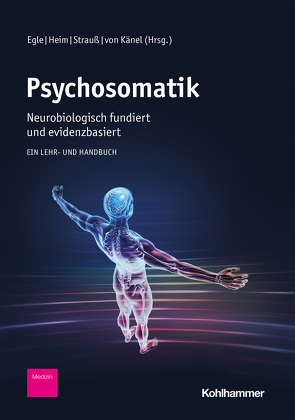
A wealth of new findings in the fields of neurobiology and molecular biology, epigenetics and developmental psychology in the field of stress research have led to a far-reaching paradigm shift in psychosomatic medicine during the last 10 years. Traditional theoretical models of various schools of psychotherapy on the development and treatment of numerous diseases with physical cardinal symptoms have consequently lost their significance. The present work begins with 21 chapters providing a current stocktaking of the scientifically proven biopsychosocial foundations of this new psychosomatics, and then in a further 68 chapters it presents the various implications for the diagnosis and treatment of numerous diseases in the different medical disciplines, based on the findings of basic research. These are supplemented by articles on social medicine, assessment and prevention.
Aktualisiert: 2023-05-03
Autor:
Laura Anderegg,
Selma Aybek,
Sarah T. Ballach,
Karl-Jürgen Bär,
Jürgen Bengel,
Elisabeth Binder,
Cornelia Bittmann,
Oliver Bohlen,
Jessica Bosch,
Peer Briken,
Emily Brindley,
Timo Brockmeyer,
Victoria Lucia Cammann,
Hannah Cheng,
Marianna Di Chiara,
Felix de Courbière,
Tatjana Crönlein,
Felix Dammering,
Monika Daubländer,
Claus Derra,
Beate Ditzen,
Florence Dorr,
Marie-Luise Ecker-Egle,
Ulrich T Egle,
Niklaus Egloff,
Ulrike Ehlert,
Sonja Entringer,
Elissa Epel,
Yesim Erim,
Hermann Faller,
Anja C. Feneberg,
Serena Fiacco,
Johannes B. Finke,
Felix Fischer,
Susanne Fischer,
Magdalena Flatscher-Thöni,
Fritjof von Franqué,
Matthias Franz,
Harald J Freyberger,
Hans-Christoph Friederich,
Ingo Froboese,
Bernd Fromm,
Jens Gaab,
Werner Geigges,
Alexander L. Gerlach,
Ulfried Geuter,
Uwe Gieler,
Ute Katharina Gitzen,
Lutz Goetzmann,
Stefan Gold,
Harald Gündel,
Alfons Hamm,
Gregor Hasler,
Winfried Häuser,
Tobias Hecker,
Thomas Heidenreich,
Christine Heim,
Beate Herpertz-Dahlmann,
Anja Hilbert,
Thomas Hillecke,
Sebastian C. Holst,
Anita Horn,
Frank Jacobi,
Jochen Jordan,
George J. Kahaly,
Roland von Känel,
Peter Fritz Keller,
Olga Klimecki,
Nina Knoll,
Andrea Knop,
Anna Katharina Koch,
Julian Koenig,
Volker Köllner,
Alexander Konnopka,
Peter C. Konturek,
Thula Koops,
Rachel Kosciusko,
Peter M. Kreuzer,
Johannes Kruse,
Karl Heinz Ladwig,
Claas Lahmann,
Astrid Lampe,
Hans-Peter Landolt,
Richard D. Lane,
Berthold Langguth,
Eike Langheim,
Jost Langhorst,
Peter Langner,
Claudia Lazarides,
Nadine Lehnen,
Astrid Lehner,
Boris Leithäuser,
Claas Lendt,
Denise Lenski,
Frank Leweke,
Karoline Lukaschek,
Wolfgang Lutz,
Andreas Maercker,
Alexandra Martin,
Anja Mehnert-Theuerkauf,
Laura Mernone,
Johannes Michalak,
Dorothee von Moreau,
Urs M. Nater,
Tobias Nolte,
Emilou Noser,
Silvia Oddo-Sommerfeld,
Christian Otte,
Ritambhara Pathak,
Achim Peters,
Eva Peters,
Katharina Peters,
Anke Petersen,
Anna Pohl,
Roman Prem,
Hans-Christian Puls,
Katharina Radziej,
Meera Rajput,
Antje Rauers,
Günter Reich,
Viktoria Ritter,
Thomas Ritz,
Volker Roelcke,
Frank Röhricht,
Matthias Rose,
Michael Rufer,
Hartmut Schächinger,
Rainer Schäfert,
Henning Schauenburg,
Martin Schecklmann,
Maren Schick,
Charlotte Lisa Schmidt,
Jennifer Schmidt,
Jessica Schoch-Ruppen,
Christian Schubert,
Stefan R. Schweinberger,
Johannes Siegrist,
Joe Simon,
Timo Slotta,
Ryan Smith,
Sarah Sommerlad,
Ulrich Stangier,
Jennifer Steel,
Timothy J. Strauman,
Bernhard Strauß,
Konrad Andreas Szawan,
Christian Templin,
Jelena Templin-Ghadri,
Veronika Vielsmeier,
Heiner Vogel,
Isi Wang,
Claudia Welte-Jzyk,
Gabriele Werner-Felmayer,
Esther Werth,
Bernhard Widder,
Christiane Wilke,
Sibylle Maria Winter,
Tewes Wischmann,
Alexander Wormit,
Stephan Zipfel,
Martina de Zwaan
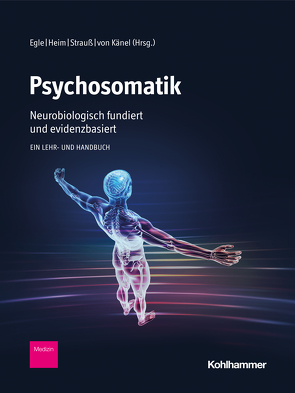
A wealth of new findings in the fields of neurobiology and molecular biology, epigenetics and developmental psychology in the field of stress research have led to a far-reaching paradigm shift in psychosomatic medicine during the last 10 years. Traditional theoretical models of various schools of psychotherapy on the development and treatment of numerous diseases with physical cardinal symptoms have consequently lost their significance. The present work begins with 21 chapters providing a current stocktaking of the scientifically proven biopsychosocial foundations of this new psychosomatics, and then in a further 68 chapters it presents the various implications for the diagnosis and treatment of numerous diseases in the different medical disciplines, based on the findings of basic research. These are supplemented by articles on social medicine, assessment and prevention.
Aktualisiert: 2023-05-02
Autor:
Laura Anderegg,
Selma Aybek,
Sarah T. Ballach,
Karl-Jürgen Bär,
Jürgen Bengel,
Elisabeth Binder,
Cornelia Bittmann,
Oliver Bohlen,
Jessica Bosch,
Peer Briken,
Emily Brindley,
Timo Brockmeyer,
Victoria Lucia Cammann,
Hannah Cheng,
Marianna Di Chiara,
Felix de Courbière,
Tatjana Crönlein,
Felix Dammering,
Monika Daubländer,
Claus Derra,
Beate Ditzen,
Florence Dorr,
Marie-Luise Ecker-Egle,
Ulrich T Egle,
Niklaus Egloff,
Ulrike Ehlert,
Sonja Entringer,
Elissa Epel,
Yesim Erim,
Hermann Faller,
Anja C. Feneberg,
Serena Fiacco,
Johannes B. Finke,
Felix Fischer,
Susanne Fischer,
Magdalena Flatscher-Thöni,
Fritjof von Franqué,
Matthias Franz,
Harald J Freyberger,
Hans-Christoph Friederich,
Ingo Froboese,
Bernd Fromm,
Jens Gaab,
Werner Geigges,
Alexander L. Gerlach,
Ulfried Geuter,
Uwe Gieler,
Ute Katharina Gitzen,
Lutz Goetzmann,
Stefan Gold,
Harald Gündel,
Alfons Hamm,
Gregor Hasler,
Winfried Häuser,
Tobias Hecker,
Thomas Heidenreich,
Christine Heim,
Beate Herpertz-Dahlmann,
Anja Hilbert,
Thomas Hillecke,
Sebastian C. Holst,
Anita Horn,
Frank Jacobi,
Jochen Jordan,
George J. Kahaly,
Peter Fritz Keller,
Olga Klimecki,
Nina Knoll,
Andrea Knop,
Anna Katharina Koch,
Julian Koenig,
Volker Köllner,
Alexander Konnopka,
Peter C. Konturek,
Thula Koops,
Rachel Kosciusko,
Peter M. Kreuzer,
Johannes Kruse,
Karl Heinz Ladwig,
Claas Lahmann,
Astrid Lampe,
Hans-Peter Landolt,
Richard D. Lane,
Berthold Langguth,
Eike Langheim,
Jost Langhorst,
Peter Langner,
Claudia Lazarides,
Nadine Lehnen,
Astrid Lehner,
Boris Leithäuser,
Claas Lendt,
Denise Lenski,
Frank Leweke,
Karoline Lukaschek,
Wolfgang Lutz,
Andreas Maercker,
Alexandra Martin,
Anja Mehnert-Theuerkauf,
Laura Mernone,
Johannes Michalak,
Dorothee von Moreau,
Urs M. Nater,
Tobias Nolte,
Emilou Noser,
Silvia Oddo-Sommerfeld,
Christian Otte,
Ritambhara Pathak,
Achim Peters,
Eva Peters,
Katharina Peters,
Anke Petersen,
Anna Pohl,
Roman Prem,
Hans-Christian Puls,
Katharina Radziej,
Meera Rajput,
Antje Rauers,
Günter Reich,
Viktoria Ritter,
Thomas Ritz,
Volker Roelcke,
Frank Röhricht,
Matthias Rose,
Michael Rufer,
Hartmut Schächinger,
Rainer Schäfert,
Henning Schauenburg,
Martin Schecklmann,
Maren Schick,
Charlotte Lisa Schmidt,
Jennifer Schmidt,
Jessica Schoch-Ruppen,
Christian Schubert,
Stefan R. Schweinberger,
Johannes Siegrist,
Joe Simon,
Timo Slotta,
Ryan Smith,
Sarah Sommerlad,
Ulrich Stangier,
Jennifer Steel,
Timothy J. Strauman,
Bernhard Strauß,
Konrad Andreas Szawan,
Christian Templin,
Jelena Templin-Ghadri,
Veronika Vielsmeier,
Heiner Vogel,
Roland von Känel,
Isi Wang,
Claudia Welte-Jzyk,
Gabriele Werner-Felmayer,
Esther Werth,
Bernhard Widder,
Christiane Wilke,
Sibylle Maria Winter,
Tewes Wischmann,
Alexander Wormit,
Stephan Zipfel,
Martina de Zwaan
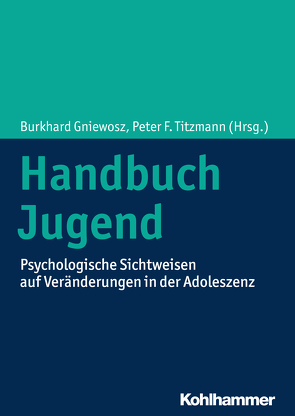
Young people face various biological, psychological and social changes - during a phase of life in which major decisions affecting their future lives and careers are being made.
This book presents the current state of research on young adulthood in a comprehensible way and explains the developments that take place during this formative period of life. The book is divided into five major topics, which provide a comprehensive overview of the major aspects involved that have been discussed academically. Initially, there is a glance at the biological foundations, followed by a discussion of the influence of social environments (family, friends and school) and of the media. The third part is concerned with important goals in young people=s development: forming an identity, developing moral ideas and learning basic competences (choosing a profession). The last two sections discuss social topics such as migration, political socialization and important developmental problems (including eating disturbances, ADHS, substance abuse), as well as options for prevention and approaches to intervention.
Aktualisiert: 2023-05-03
Autor:
Jens B. Asendorpf,
Andreas Beelmann,
Jens Blechert,
Anja Blumenthal,
Carolin Braun,
Viola Braun,
Leonard Bruckmann,
Marlis Buchmann,
Fatma Celik,
Anne Deiglmayr,
Katharina Eckstein,
Luciano Gasser,
Kiaras Gharabaghi,
Burkhard Gniewosz,
Verena Gralke,
Bettina Hannover,
Alexandra Iwanski,
Linda Juang,
Michael Kaess,
Julian Koenig,
Laura König,
Stephanie Lichtenfeld,
Marko Lüftenegger,
Claudia Mähler,
Tina Malti,
Hannah Margraf,
Sabine Maur,
Adrian Meule,
Gerhild Nieding,
Peter Noack,
Boris Orth,
Martin Pinquart,
Fritz Podewski,
Theda Radtke,
Theresa Reichenberger,
Olaf Reis,
Lennart Schalk,
Herbert Scheithauer,
Anne Schmidt,
Barbara Schober,
Urte Scholz,
Elke Schroeder,
Kirsten Schuchardt,
Christina Schwenck,
Inge Seiffge-Krenke,
Christiane Spiel,
Christoph Steinebach,
Annekatrin Steinhoff,
Elsbeth Stern,
Peter F. Titzmann,
Jürgen Töppich,
Sabine Walper,
Stephan Warncke,
Karina Weichold,
Sarah Weigelt,
Ilka Wolter,
Lysann Zander,
Esther Ziegler,
Peter Zimmermann
MEHR ANZEIGEN
Bücher von Koenig, Julian
Sie suchen ein Buch oder Publikation vonKoenig, Julian ? Bei Buch findr finden Sie alle Bücher Koenig, Julian.
Entdecken Sie neue Bücher oder Klassiker für Sie selbst oder zum Verschenken. Buch findr hat zahlreiche Bücher
von Koenig, Julian im Sortiment. Nehmen Sie sich Zeit zum Stöbern und finden Sie das passende Buch oder die
Publiketion für Ihr Lesevergnügen oder Ihr Interessensgebiet. Stöbern Sie durch unser Angebot und finden Sie aus
unserer großen Auswahl das Buch, das Ihnen zusagt. Bei Buch findr finden Sie Romane, Ratgeber, wissenschaftliche und
populärwissenschaftliche Bücher uvm. Bestellen Sie Ihr Buch zu Ihrem Thema einfach online und lassen Sie es sich
bequem nach Hause schicken. Wir wünschen Ihnen schöne und entspannte Lesemomente mit Ihrem Buch
von Koenig, Julian .
Koenig, Julian - Große Auswahl an Publikationen bei Buch findr
Bei uns finden Sie Bücher aller beliebter Autoren, Neuerscheinungen, Bestseller genauso wie alte Schätze. Bücher
von Koenig, Julian die Ihre Fantasie anregen und Bücher, die Sie weiterbilden und Ihnen wissenschaftliche Fakten
vermitteln. Ganz nach Ihrem Geschmack ist das passende Buch für Sie dabei. Finden Sie eine große Auswahl Bücher
verschiedenster Genres, Verlage, Schlagworte Genre bei Buchfindr:
Unser Repertoire umfasst Bücher von
Sie haben viele Möglichkeiten bei Buch findr die passenden Bücher für Ihr Lesevergnügen zu entdecken. Nutzen Sie
unsere Suchfunktionen, um zu stöbern und für Sie interessante Bücher in den unterschiedlichen Genres und Kategorien
zu finden. Neben Büchern von Koenig, Julian und Büchern aus verschiedenen Kategorien finden Sie schnell und
einfach auch eine Auflistung thematisch passender Publikationen. Probieren Sie es aus, legen Sie jetzt los! Ihrem
Lesevergnügen steht nichts im Wege. Nutzen Sie die Vorteile Ihre Bücher online zu kaufen und bekommen Sie die
bestellten Bücher schnell und bequem zugestellt. Nehmen Sie sich die Zeit, online die Bücher Ihrer Wahl anzulesen,
Buchempfehlungen und Rezensionen zu studieren, Informationen zu Autoren zu lesen. Viel Spaß beim Lesen wünscht Ihnen
das Team von Buchfindr.



















